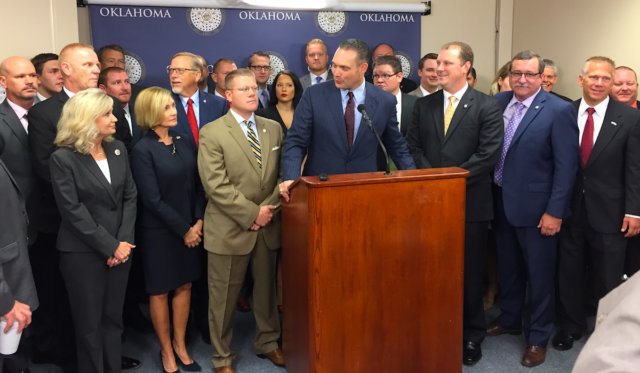

In a political climate charged with anger against Oklahoma’s recent legislative shortcomings, it might seem popular to punish lawmakers by reducing their annual salaries, but that does not prove it is a good idea.
Last week, Oklahoma’s Board of Legislative Compensation discussed that possibility before ultimately deciding to meet again in four months for reconsideration.
On social media, citizens frustrated by a sputtering special session promoted the notion that legislator pay is too high. Proof that legislator pay should be reduced, some said, is in the pudding… err… gruel.
“They got us in this mess, they should suffer the consequences,” wrote one voter on Facebook.
Another had this to say:
Yes!!! So much yes!!! Legislators are WAY over paid for having absolutely zero accountability. It’s ridiculous that all of them get per diem as well.
But the public outcry against legislator pay — $38,400 plus health and retirement benefits and per diem for those living 50 miles from the Capitol — misses one key concept meant to improve representative democracy, not hurt it.
Not all potential lawmakers are wealthy
While lawmakers are typically only in session about four months of the year, their duties to the people of their districts are year-round. Additionally, four months of session at the Capitol in Oklahoma City limit lawmakers’ full-time employment options. For instance, educators who win election to the Legislature typically have to put their teaching careers on hold.
Beyond the professional adjustments lawmakers often have to make for the privilege of serving their constituents, it is important to consider what decreasing legislator pay might mean for the type of people who could run for office.
With the role of money in elections already disincentivizing average Oklahomans from seeking political office, any decrease of legislator pay could quite possibly result in more seats being held by financially fortunate people.
Since the Oklahoma Legislature has often shown an inability to relate to common folk, further gaming the system toward the election of wealthy Oklahomans would seem like a step in the wrong direction.
Board fails transparency test
If the Board of Legislative Compensation is ultimately hell-bent on making some sort of changes, perhaps its first focus could be on improving its own transparency.
State websites referencing the LCB are outdated, vague and devoid of information. Google and ok.gov searches fail to yield a list of LCB members, and the most recent digital agenda of the board’s biennial meetings seems to be from 2015.
If anything, the Board of Legislative Compensation may have violated the spirit of the Oklahoma Open Meeting Act by not posting its 2017 agenda online. Was the agenda posted in the front window of the Office of Management and Enterprise Services ahead of last week’s meeting? Hard to know. The Capitol was closed for repairs, meaning the board met in the Will Rogers Building, despite the direction of state statute.
With the LCB questioning whether lawmakers are doing their jobs adequately, perhaps lawmakers should question whether the LCB is meeting its transparency obligations to the public.
Interesting questions to be discussed
Lastly, social media conversations about legislator pay have raised other interesting questions this week. While the answers are up for debate, there are many areas requiring perspective.
Is lawmaker per diem — tied to the federal rate — too high? It might be for legislators who live 51 miles away, but for those who live 100-plus miles away and rent apartments in OKC, it probably is not.
Is it ironic that lawmakers — who have yet to find a way to increase teacher pay to the regional average — earn more in the Legislature than many instructors do in classrooms? Yes, it certainly is, but raising teacher pay would serve the state’s interests far better than cutting legislator pay would.
If the Board of Legislative Compensation discusses that at its impending special meeting, the public would likely appreciate proper notification in this world of digital communications.




















